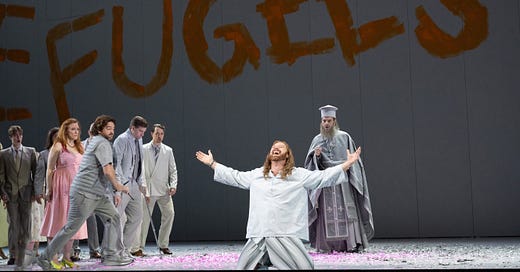Refugees Out! Sebastian Kohlhepp (Manolios, centre), Gabor Bretz (Grigoris, behind him), Sara Jakubiak (Katerina, left in pink) appeals to the village’s humanity Picture by Monika Rittershaus
In the 34 years since the death of Herbert Von Karajan - a period almost as long as his artistic directorship (1956-1989) - the Salzburg Festival has evolved exponentially. The repertoire is far wider, embracing more cutting-edge contemporary music and ‘period’ repertoire than would have been tolerated in Karajan’s era. And yet the late Austrian megamaestro’s fingerprints can still be detected all over the concert programme. This comprises a series of Vienna Philharmonic concerts with the most celebrated conductors, alongside visits from the world’s greatest orchestras, the “Karajan” Berlin Philharmonic among them. No wonder Salzburg is still regarded as the world’s most prestigious summer music bash - the ‘Cannes of Classical Music’ if you like.
Opera tickets are still pricey, making the Royal Opera’s top-whack for this week’s Das Rheingold in London - advertised on its website between £193 and £325 for currently available seats - look bargain-basement. But the quality and character of performances at Salzburg have changed out of recognition. At my first visit as a student in 1973, I paid the equivalent of £10 for a star-studded Così fan tutte, conducted by Karajan’s older Austrian rival, Karl Böhm. It was more than I had ever paid for an opera ticket, but it was worth it for singers who then rarely came to Covent Garden: Gundula Janowitz and Brigitte Fassbaender as the sisters, Peter Schreier and Hermann Prey as their admirers. That production, premiered in 1972, endured for almost a decade. This was the pattern of Karajan’s Salzburg - repeated revivals with exemplary singers kept the tills a-tinkling at eye-watering prices. You paid for, and got, the best.
When, two years after Karajan’s death, the Belgian administrator Gerard Mortier began his 10-year regime as artistic director, it was as if someone had thrown a bomb into Salzburg’s cosy consensus, provoking hostile reactions from the Viennese press and public. Mortier’s response? Two fingers in the shape of a series of Regietheater productions, culminating in a Fledermaus, that most Viennese of Viennese operettas, by the German iconoclast Hans Neuenfels in 2001. Mortier never wanted to be loved!
Since Mortier, there have been five general directors and one interregnum, but the opera programming still bears the Belgian’s unmistakeable hallmarks. Alexander Pereira (2011 - 2014) presented only new productions at his festivals. This year’s opera programme, under Markus Hinterhäuser, included Christof Loy’s staging of Orfeo ed Euridice (a vehicle for Cecilia Bartoli, premiered at the Whitsun Festival), a new Figaro directed by Martin Kušej of Covent Garden Idomeneo shark notoriety, plus new takes on Verdi’s Macbeth and Falstaff by Krzysztof Warlikowski and Christoph Marthaler respectively. There was also a Salzburg first: Martinu’s The Greek Passion directed by Simon Stone.
Keep reading with a 7-day free trial
Subscribe to Operalogue to keep reading this post and get 7 days of free access to the full post archives.




